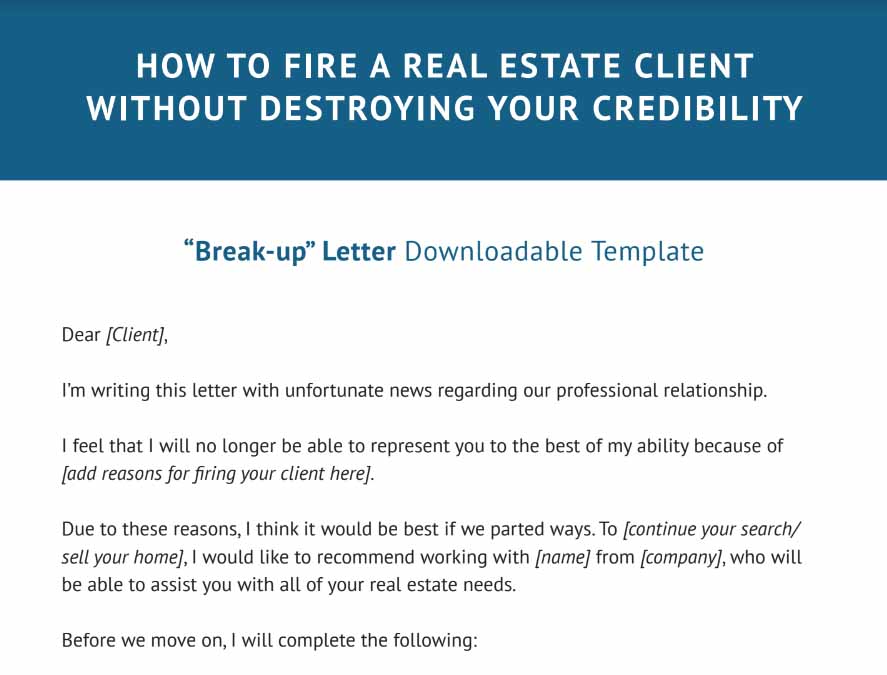As a newly licensed real estate agent, it’s common to feel overwhelmed by all the tasks that need to be done and confused about how to get started. Having the right tips and advice is essential to jump-start your career growth instead of plateauing early on. Choosing the right brokerage and creating a marketing plan, finding a mentor, and knowing how to fire a client are some of the most effective steps to ensure you start on the right path.
Keep reading and take notes on the top 16 new real estate agent tips to start a lucrative real estate career.
1. Choose the Right Real Estate Brokerage
One of the first and most important decisions you make as a new real estate agent is choosing your real estate brokerage. Every brokerage has different pros and cons, so make sure you schedule interviews at multiple real estate brokerages and truly evaluate the best choice for you.
One of the best new realtor tips is to focus heavily on the education, support, and tools you receive from your first brokerage. You always have the option to switch your real estate company, but you only begin your real estate career once—ensure you have the tools to get your business off the ground from the get-go.
Although you need to take your real estate resume and answer some questions, remember that these interviews are just as important for you, if not more so. Ask the brokerage specific questions and think carefully about your needs and goals in your new career.
Learn more details about deciding on your brokerage and use our free real estate brokerage evaluation sheet in our article How to Choose a Real Estate Company to Work For.
2. Seek Out Additional Training Opportunities
The process of becoming a real estate agent always involves coursework, but don’t assume that the required education will provide you with new real estate agent advice. After receiving your real estate license, you will need training that focuses specifically on starting, running, and growing a business as a real estate salesperson. In fact, one of the most common reasons why agents fail is because of a lack of training and support in their first one to two years in the industry.
Most real estate brokerages provide some level of education, but many are not focused on equipping new agents for a strong career. If you cannot find a brokerage or company that provides the tools or support you need, you’ll have to search for the education independently. There are many other options to help you find new real estate agent tips, like working with a mentor or a real estate coach, joining memberships, or reading real estate books.

Colibri’s career hub with real estate content (Source: Colibri Real Estate)
In addition to some structured training program or mentorship, there are many free resources and articles in Colibri Real Estate’s Career Hub. Learn tips about managing transactions, marketing to real estate leads, growing a social media audience, and home projects.
In addition, you can purchase a wide variety of continuing education (CE) and professional development courses from Colibri at any time. Its course topics are highly relevant to new and modern real estate agents, with courses like “Millennials in Real Estate” and “Niche Marketing for Real Estate.”
Visit Colibri Real Estate – Use Promo Code: FSB30 for 30% off
3. Establish a Schedule & Stick to It
If you worked in a corporate office or owned a retail shop, you’d have a clear, regular schedule when you had to be in the office or make sure the doors were open. In real estate, there is no “open” sign or customers waiting for the doors to open. Although one of the benefits of working in real estate is flexibility, this can actually become a challenge when you’re new to real estate.
You may be receiving new client calls late in the evening or showing requests first thing in the morning, which is difficult to learn how to manage. If you don’t start by organizing a schedule, you will inevitably find yourself overworking and not necessarily over-earning. By creating and sticking to a schedule, you’ll be able to complete the necessary income-producing tasks that are often forgotten by new agents.
For example, create time blocks every week to focus on tasks like:
- Progressing through training material
- Following up with leads
- Creating and scheduling social media content for the week
- Writing and sending a real estate newsletter
- Showings, property tours, and open houses
- Lead generation efforts
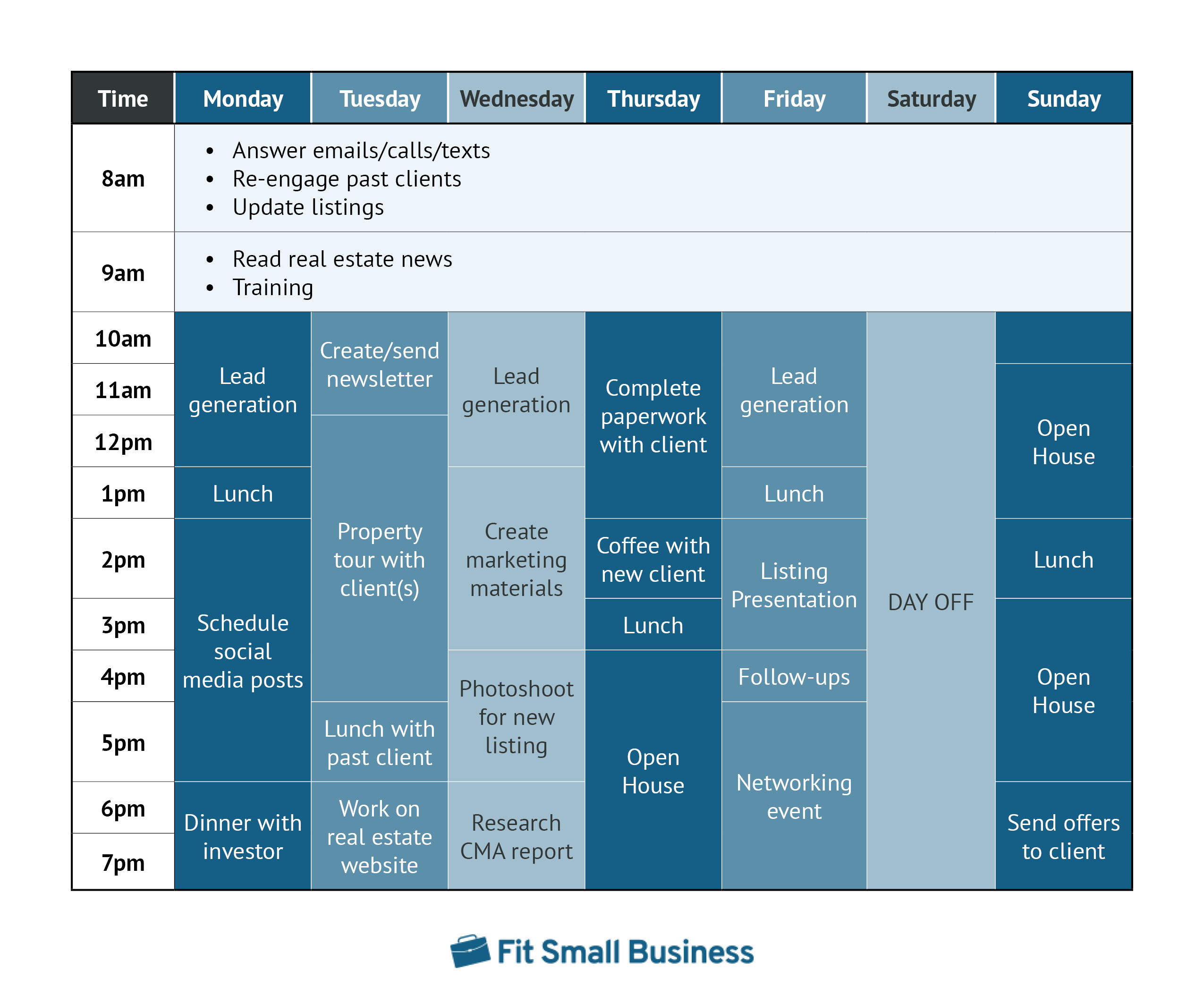
Sample daily schedule of a new real estate agent
Organizing and implementing a schedule is one of the most important tips for beginning real estate agents because it directly impacts your ability to serve current clients and generate real estate leads. Unfortunately, many experienced real estate agents struggle with an unmanaged schedule for years, preventing them from earning the income they deserve and actually enjoying their careers.
Pro tip:
Just because you have a flexible schedule as a real estate agent doesn’t mean you work every day. One extremely important new real estate tip is to schedule a day off in your calendar once a week and a vacation now and then, and hold yourself to it. A tired and burned-out real estate agent is of no use to your clients and will cost you money and energy in the long run.
4. Seek Out a Mentor for Advice & Support
There are endless resources available for real estate professionals in every niche and of all experience levels. However, following experts online for real estate tips and Googling answers to your questions will only get you so far. If you are serious about creating a long-term real estate career, there is nothing more valuable than getting advice for new realtors from someone with hard-earned experience.
If you’re lucky, you’ll join a brokerage that automatically pairs new real estate agents with a mentor. If not, find a real estate mentor on your own. You’ll need at least one experienced professional who you can reach out to with questions, but it’s even better if you can meet regularly to discuss your struggles and questions with clients, the real estate market, scheduling, or making money.
Look for potential mentors at your brokerage or join and attend real estate associations like the National Association of Realtors (NAR). Finding the right real estate mentor can take time and effort, but it can also be the difference between struggling as an agent and launching a successful career.
5. Create a Real Estate Business Plan
As a beginner real estate agent, your first goal will probably just be finding your first client and completing a successful transaction. However, if you want to build a business that sets you up for long-term success, you’ll need a long-term plan. A real estate business plan will help you in every area of your business, and it doesn’t have to be overly complex.
In the beginning, keep your focus and your business plan simple. Start by:
- Setting goals for the next 90 days
- Establishing a small number of marketing strategies (Facebook, email marketing, or direct mail)
- Establish a marketing budget
- Determining the highest priority tasks
- Identifying your unique selling proposition (USP), or what makes you stand out from others
- Specifying ways to meet and network with real estate professionals and potential clients
Having a general business plan will help you stay focused on the most important parts of your business instead of getting carried away with tasks and ideas that don’t contribute to your bottom line. Beginner real estate agent tips are much different than tips for agents who have been in the industry for 10 years. Don’t overcomplicate your business right away, but focus on building a strong foundation and slowly layer on the right tools, goals, and technology as you grow.
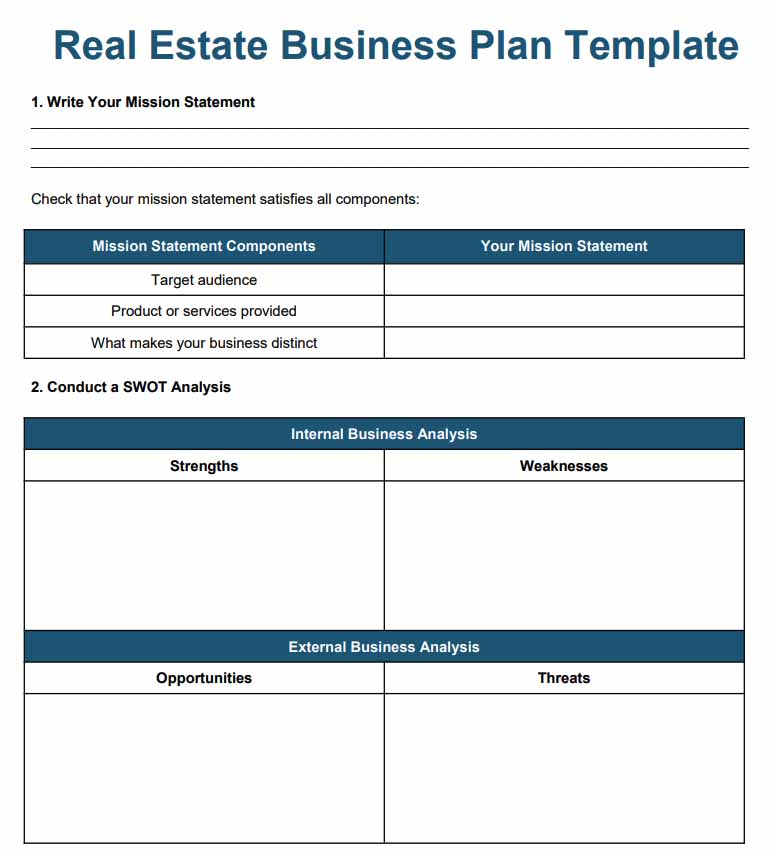
Business plan template
If you need guidance on what to include and how to organize your business, take a look through our article How to Write a Real Estate Business Plan (+ Free Template) and download the free business plan template to get started.
6. Network Personally & Professionally
Real estate is a complex industry, and it can be challenging to navigate on your own. In addition to taking professional courses and getting support from a mentor, make an effort to build friendships with other new or experienced real estate agents. A real estate buddy can be helpful when you need accountability to work through the many tasks on your to-do list. You can block time in your schedule to create marketing materials, test different platforms, and bounce ideas off each other.
Networking is also essential to growing your business and becoming known as a reliable real estate expert. It may be uncomfortable at first, but finding great networking opportunities is easy with a little bit of effort. Putting yourself in a digital or in-personal space where other professionals are active will help you form connections that could generate thousands of dollars’ worth of real estate leads or real estate referral fees in the future.
A few places to start networking include:
- Real estate conventions: Plan for well-known annual events like the NAR NXT, Tom Ferry’s Success Summit, or Inman Connect.
- Business conventions and events: Create professional connections by attending local conventions for businesses or marketing.
- Real estate associations: Join local and national associations like the National Association of Realtors (NAR) and the American Real Estate Society (ARES).
- Networking groups: Use websites like Meetup.com and Eventbrite to find networking groups and events that meet in your area regularly.
- Facebook groups: No matter where you live, there are likely many Facebook groups for real estate professionals and real estate listings. Do a simple search on the platform to find groups in your area.
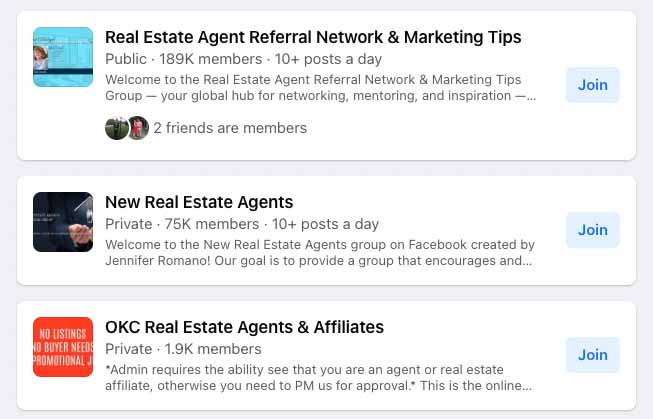
Real estate agent Facebook groups (Source: Facebook)
7. Form Safety Plans
Another great real estate agent tip and reason it’s important to have friends in the real estate world is for safety. Instead of spending hours at an open house by yourself in an unlocked, unprotected property, buddy up with another agent. Attend showings and open houses together, and keep tabs on each other’s appointments and locations so no one is left in an unsafe situation.
Make sure you prepare yourself with a safety plan for every scenario, whether you’re meeting a potential client, visiting a new listing, or hosting an open house. Your safety plan should include:
- System for screening new leads and clients
- Creating a distress code with multiple friends and family members by phone or text
- Scouting locations for hazards
- Purchasing and carrying a self-defense weapon
- Parking and standing strategically so you can always make a quick exit
- Use phone safety apps like Find My iPhone or Watch Over Me
8. Track Your Finances
Working in real estate is not the same as being an employee, where you are guaranteed a salary or weekly paycheck. This means that taxes aren’t automatically taken out of your income, and you’ll have business expenses like office fees and marketing materials to pay for and keep track of. That’s why one of the most important tips for starting real estate agents is to learn how to manage your finances.
Instead of budgeting monthly, as many people with a scheduled income do, try planning for yearly expenses, both for personal and business reasons. Open a separate bank account for business income and expenses, save all receipts, and start tracking profits and losses with a P&L sheet. For more detail about managing your finances as a new real estate agent, read 18 Real Estate Agent Tax Deductions & Tips to Save Money
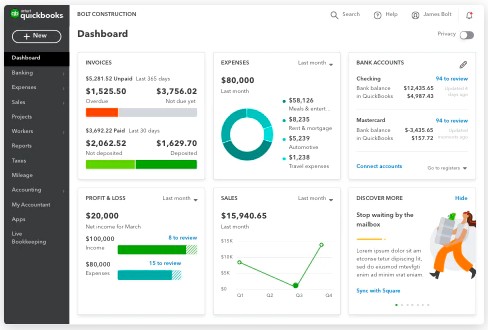
QuickBooks dashboard (Source: QuickBooks)
Whether you learn how to best manage your finances or you hire a bookkeeper or CPA, you need reliable accounting software like QuickBooks. QuickBooks can streamline all financial processes, generate reports, and simplify preparation for quarterly and annual taxes. QuickBooks is one of the top accounting software because of its extensive tools that are easy to use for small business owners who aren’t financially savvy.
Pro tip:
Start your real estate career with a financial cushion. It’s common for new real estate agents not to make any money for the first few months of their business. Set realistic expectations about this so you can be financially prepared and stay focused on long-term success instead of needing an immediate paycheck.
9. Familiarize Yourself With Important Documents & Laws
One of the least glamorous but most important parts of being a real estate professional is knowing the laws and restrictions in the country and state where you live. Make sure you are not only aware of them but that you understand them well enough to recognize violations and explain them to future clients. Sometimes you’ll need to recognize the law to protect yourself, and other times you’ll have to guide clients in a way that follows the laws exactly.
For example, it would be easy to make a RESPA violation by referring your clients to a service provider (like a mortgage broker, appraiser, or home inspector) and receiving some type of gift. While referrals are not illegal in themselves, there are restrictions about how they’re made and how real estate referral fees must be managed.
To provide ethical referrals, give your clients a few different options and allow them to choose their vendors independently. When referral fees are involved, include a written disclaimer that you will receive a financial payment if your clients choose a particular vendor.

Another important law to be familiar with is the Fair Housing Act. It prohibits real estate agents from discussing crime statistics in different neighborhoods with their clients to prevent discrimination in homeownership. You can, however, explain why your answer is limited and guide clients to resources that will help them answer their questions independently. Make sure you learn more about protecting yourself and your clients in our guide, Fair Housing Definition: A Comprehensive Guide for Real Estate Agents.
10. Establish Your Unique Real Estate Brand
There are approximately 3 million active real estate agents in the U.S., so you can’t expect clients to come running to you as soon as you announce you have a license. Competition is stiff, so you need to differentiate yourself from other agents competing for the same clients by building a real estate brand.
Branding yourself includes choosing your signature colors, fonts, and designing a logo, but it’s also more than just graphic design. Creating a memorable brand also means defining your target audience, unique selling proposition, and planning to incorporate all of these factors into your headshot, website design, and social media posts.

Real estate branding freelance services (Source: Fiverr)
To help you save time and energy, consider finding a branding expert on Fiverr, a freelance marketplace. With a quick search, you’ll find thousands of branding specialists who offer affordable services and packages to help you get a professional logo, color palette, website design, and even social media templates. Start searching on Fiverr now.
11. Nurture Your Sphere of Influence (SOI)
Since there is no cut-and-dry method of becoming successful in real estate, you may find real estate agent tips for beginners with hundreds of potential ways to generate leads and find clients. That can be extremely overwhelming, but the absolute best way to find your first client is by targeting your sphere of influence.
Your sphere of influence consists of your friends, family members, and acquaintances who already know you and have some level of trust and respect for you. Your friends and family members who already know your trustworthiness are much more likely to hire you for your first transaction.
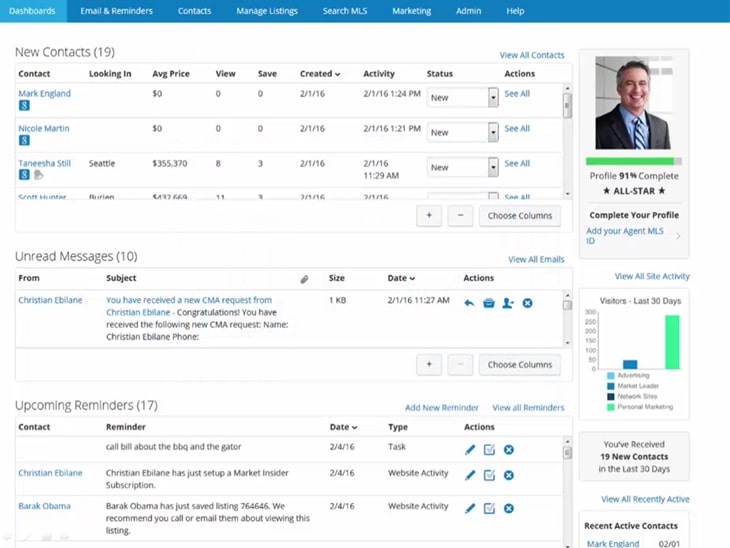
Suite Agents’ CRM dashboard with New Contacts section (Source: Market Leader)
Plus, it’s easy to reach out to your sphere of influence since it is made up of people you already have regular contact with. Consider using a tool like Market Leader to help you automate communications, keep track of all your contacts, and create marketing materials and a website. It includes a full marketing suite to help you easily generate branded materials to grow your sphere of influence into a consistent pipeline of new leads.
Pro tip:
Marketing to your sphere of influence will help you start generating real estate referrals, which are arguably the most powerful source of real estate leads. According to the National Association of Realtors (NAR), 38% of buyers and 63% of sellers worked with an agent who was referred to them.
12. Leverage Technology to Manage Leads & Contacts
As soon as you get your real estate license, you should have a plan to keep track of your communication with each of your friends, family members, professionals, and other real estate leads. The best way to do this is by using a real estate client relationship manager (CRM), which makes it easy to track all of your contacts, automate follow-ups, and prevent any potential clients from falling through the cracks.
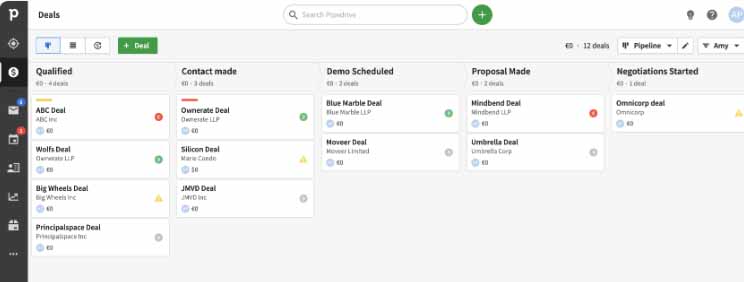
Visual pipeline in Pipedrive (Source: Pipedrive)
For example, Pipedrive is a sales CRM with a visual pipeline, making it easy to see exactly where each of your contacts is in the sales process. Plus, you can customize your funnel to market the most effectively to different types of leads, like buyers, FSBOs, and previous clients. Pipedrive also sends automatic alerts and reminders to communicate with leads and clients, so you don’t have to stay glued to your phone. Try Pipedrive free for 30 days.
13. Create a Real Estate Marketing Plan
Among the best real estate tips for new agents, there is an unlimited amount of information about specific marketing strategies and tactics to use. The key to marketing your business effectively is starting with a comprehensive plan instead of jumping on a few specific tactics that are recommended.
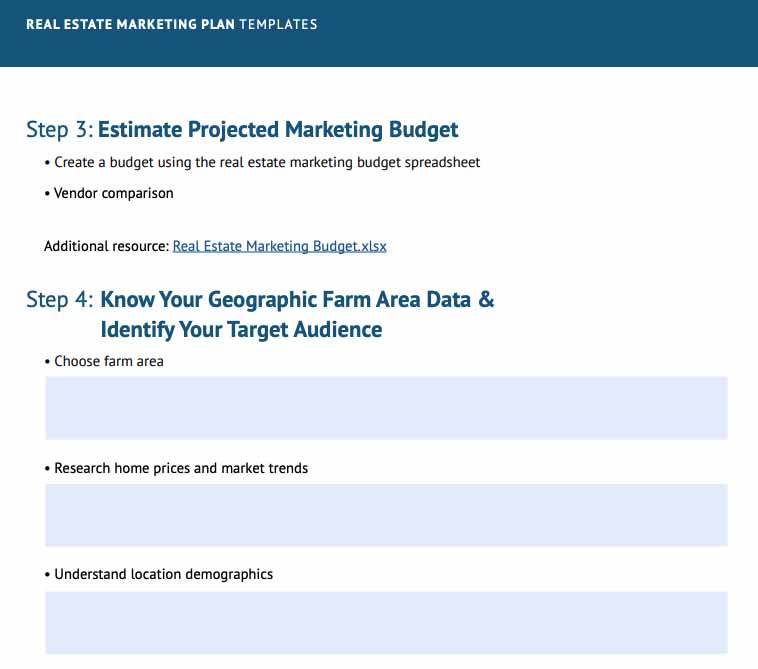
Real estate marketing plan template from Fit Small Business
As you create your marketing plan, keep in mind that you don’t need to complete every available marketing task immediately. Marketing is a full-time job, and if you spend days or weeks building a website or an audience, you won’t actually be working with real estate clients. Instead, ensure you have a clear list of priorities to avoid getting carried away with tasks that aren’t the most valuable for your business. Think about consulting your mentor, coach, or colleagues to help you define the most important tasks for your new real estate business.
To learn how to make a plan that sets you up for success and get a free template, visit our guide Free Real Estate Marketing Plan Template & Strategy Guide
14. Invest in Marketing Materials
The sooner you start marketing yourself as an agent, the sooner you’ll be able to serve clients and get a paycheck. Although it can be challenging for brand-new agents to spend money on their business before they generate an income, having marketing materials on hand is incredibly important for building a trustworthy reputation and brand recognition.
Using your unique branding elements, start gathering the basic and most important marketing materials, including:
- Creating and ordering real estate business cards
- Taking a professional realtor headshot
- Creating social media pages (TikTok, Facebook, LinkedIn, YouTube, Instagram)
- Writing your real estate bio
- Writing automated emails campaigns to send to new leads
- Setting up your Zillow agent profile

Example of Canva real estate flyer templates (Source: Canva)
When you’re starting out, you don’t need to overcomplicate this process by hiring an expensive graphic designer and ordering thousands of materials. Instead, you can easily create your own professional materials and designs with Canva, an easy-to-use graphic design platform. It provides thousands of real estate templates for everything—from business cards to social media headers. All designs are customizable, with an endless number of graphics, animations, fonts, and photos. Start using Canva for free!
15. Educate Yourself on Available Inventory & Market Trends
One of the most important real estate agent tips to follow is to develop a strong understanding of the real estate market. Make sure you not only understand how the real estate market works, but also specifics about your local market, including real estate statistics, the differences between local neighborhoods, the types of homes around the area, popular home features, and how much or how little inventory there is at any given time.
Here are a few strategies to learn more about the inventory in your area and your local market:
- Make showing appointments on your own: Get comfortable with the process of scheduling a showing, opening lockboxes, and touring houses.
- Evaluate each listing’s strengths and weaknesses: Take notes about each home’s features and potential concerns, like cracks in the basement walls or an old hot water heater.
- Drive through neighborhoods: Find neighborhoods that you aren’t already familiar with and take note of property values and home features.
- Use Zillow and the MLS to search for properties and run reports: Learn how to search for properties with varying filters and create a comprehensive comparative market analysis (CMA) for listing leads.
Your local MLS is generally the most reliable place to find property details, like lot size, room sizes, home features, and information about the listing agent. However, since the MLS is not accessible to the general public, the majority of homebuyers will use Zillow to search for properties and look at photos. For this reason, it’s useful to familiarize yourself with the properties visible on Zillow so you can easily communicate with potential homebuyers.
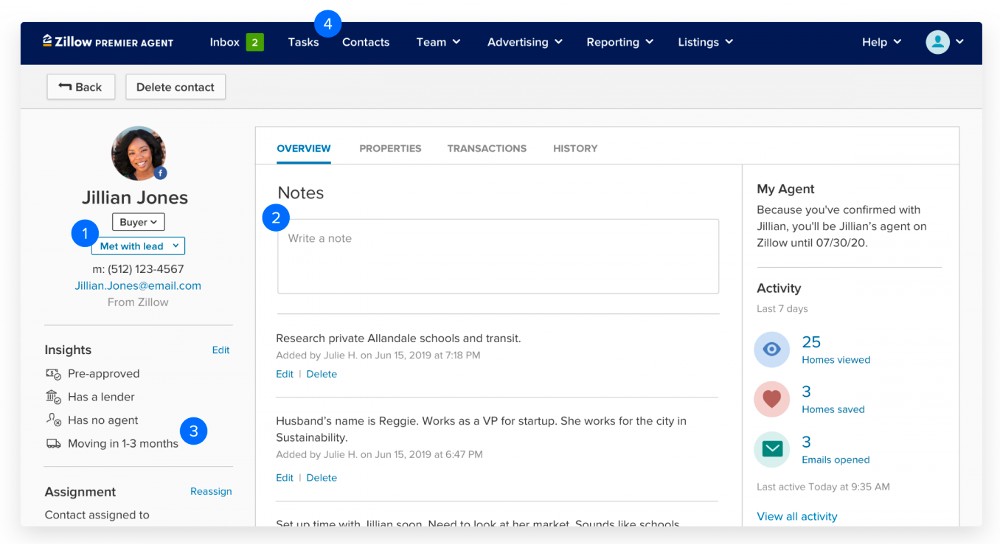
Zillow Premier Agent transaction management tools (Source: Zillow)
In addition, Zillow is one of the most valuable lead generation sources since it’s the top real estate platform with about 60 million monthly users. As a Zillow Premier Agent, you’ll receive access to a variety of tools and resources to build your business, like highly motivated buyer leads, priority placement on local listings, and pipeline management tools within the free CRM.
Read what our experts think about Zillow in our expert Zillow Premier Agent review.
16. Know How to Fire Clients
Even though real estate agents’ and brokers’ businesses are built on client transactions, not all real estate clients are created equal. While most clients are great, you will inevitably find clients who are not fit for a real estate transaction due to inappropriate behavior, dishonesty, or unprepared finances. Learning how to fire a real estate client and knowing when to do so is an essential new real estate agent tip for your well-being and the growth of your business.
Start by identifying which client offenses justify firing and which offenses can be handled or prevented with your broker or through your client contract. For example, it’s common for first-time buyers to have unrealistic expectations for their ideal property and budget. In most cases, this can be overcome by having a professional, honest conversation. However, there are cases in which clients refuse to cooperate and will ultimately waste your time and energy.
In other unfortunate cases, your clients may be dishonest or inappropriate, and it’s necessary to let them go immediately. When it’s time to fire clients, be prepared with a breakup letter or script. Start by downloading this free client breakup letter template:
Bottom Line
It can feel like there are an impossible number of tasks and obstacles to overcome as a new real estate agent. Using these tips and tools, take one step at a time and stay focused on building a strong foundation for your business. With the right education and support, your real estate business will steadily grow, and you’ll be able to confidently serve clients and reach your goals.
